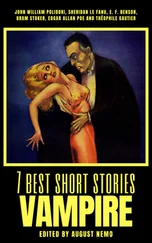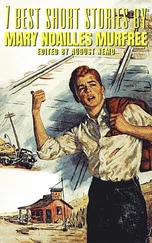“I should say not!” said the other. “I’ll give him half an hour at least. If Jimmy is alive on earth he’ll be here by that time. So long, officer.”
“Good-night, sir,” said the policeman, passing on along his beat, trying doors as he went.
There was now a fine, cold drizzle falling, and the wind had risen from its uncertain puffs into a steady blow. The few foot passengers astir in that quarter hurried dismally and silently along with coat collars turned high and pocketed hands. And in the door of the hardware store the man who had come a thousand miles to fill an appointment, uncertain almost to absurdity, with the friend of his youth, smoked his cigar and waited.
About twenty minutes he waited, and then a tall man in a long overcoat, with collar turned up to his ears, hurried across from the opposite side of the street. He went directly to the waiting man.
“Is that you, Bob?” he asked, doubtfully.
“Is that you, Jimmy Wells?” cried the man in the door.
“Bless my heart!” exclaimed the new arrival, grasping both the other’s hands with his own. “It’s Bob, sure as fate. I was certain I’d find you here if you were still in existence. Well, well, well! – twenty years is a long time. The old restaurant’s gone, Bob; I wish it had lasted, so we could have had another dinner there. How has the West treated you, old man?”
“Bully; it has given me everything I asked it for. You’ve changed lots, Jimmy. I never thought you were so tall by two or three inches.”
“Oh, I grew a bit after I was twenty.”
“Doing well in New York, Jimmy?”
“Moderately. I have a position in one of the city departments. Come on, Bob; we’ll go around to a place I know of, and have a good long talk about old times.”
The two men started up the street, arm in arm. The man from the West, his egotism enlarged by success, was beginning to outline the history of his career. The other, submerged in his overcoat, listened with interest.
At the corner stood a drug store, brilliant with electric lights. When they came into this glare each of them turned simultaneously to gaze upon the other’s face.
The man from the West stopped suddenly and released his arm.
“You’re not Jimmy Wells,” he snapped. “Twenty years is a long time, but not long enough to change a man’s nose from a Roman to a pug.”
“It sometimes changes a good man into a bad one,” said the tall man. “You’ve been under arrest for ten minutes, ‘Silky’ Bob. Chicago thinks you may have dropped over our way and wires us she wants to have a chat with you. Going quietly, are you? That’s sensible. Now, before we go on to the station here’s a note I was asked to hand you. You may read it here at the window. It’s from Patrolman [70]Wells.”
The man from the West unfolded the little piece of paper handed him. His hand was steady when he began to read, but it trembled a little by the time he had finished. The note was rather short.
Bob: I was at the appointed place on time. When you struck the match to light your cigar I saw it was the face of the man wanted in Chicago. Somehow I couldn’t do it myself, so I went around and got a plain clothes man [71] to do the job.
JIMMY.
On his bench in Madison Square Soapy moved uneasily. When wild geese honk high of nights, and when women without sealskin coats grow kind to their husbands, and when Soapy moves uneasily on his bench in the park, you may know that winter is near at hand.
A dead leaf fell in Soapy’s lap. That was Jack Frost’s card. Jack is kind to the regular denizens of Madison Square, and gives fair warning of his annual call. At the corners of four streets he hands his pasteboard to the North Wind, footman of the mansion of All Outdoors, so that the inhabitants thereof may make ready.
Soapy’s mind became cognisant of the fact that the time had come for him to resolve himself into a singular Committee of Ways and Means to provide against the coming rigour. And therefore he moved uneasily on his bench.
The hibernatorial ambitions of Soapy were not of the highest. In them there were no considerations of Mediterranean cruises, of soporific Southern skies drifting in the Vesuvian Bay [72]. Three months on the Island was what his soul craved. Three months of assured board and bed and congenial company, safe from Boreas [73]and bluecoats [74], seemed to Soapy the essence of things desirable.
For years the hospitable Blackwell’s [75]had been his winter quarters. Just as his more fortunate fellow New Yorkers had bought their tickets to Palm Beach and the Riviera [76]each winter, so Soapy had made his humble arrangements for his annual hegira to the Island. And now the time was come. On the previous night three Sabbath newspapers, distributed beneath his coat, about his ankles and over his lap, had failed to repulse the cold as he slept on his bench near the spurting fountain in the ancient square. So the Island loomed big and timely in Soapy’s mind. He scorned the provisions made in the name of charity for the city’s dependents. In Soapy’s opinion the Law was more benign than Philanthropy. There was an endless round of institutions, municipal and eleemosynary, on which he might set out and receive lodging and food accordant with the simple life. But to one of Soapy’s proud spirit the gifts of charity are encumbered. If not in coin you must pay in humiliation of spirit for every benefit received at the hands of philanthropy. As Caesar [77]had his Brutus [78], every bed of charity must have its toll of a bath, every loaf of bread its compensation of a private and personal inquisition. Wherefore it is better to be a guest of the law, which though conducted by rules, does not meddle unduly with a gentleman’s private affairs.
Soapy, having decided to go to the Island, at once set about accomplishing his desire. There were many easy ways of doing this. The pleasantest was to dine luxuriously at some expensive restaurant; and then, after declaring insolvency, be handed over quietly and without uproar to a policeman. An accommodating magistrate would do the rest.
Soapy left his bench and strolled out of the square and across the level sea of asphalt, where Broadway and Fifth Avenue flow together. Up Broadway he turned, and halted at a glittering café, where are gathered together nightly the choicest products of the grape, the silkworm and the protoplasm.
Soapy had confidence in himself from the lowest button of his vest upward. He was shaven, and his coat was decent and his neat black, ready-tied four-in-hand had been presented to him by a lady missionary on Thanksgiving Day. If he could reach a table in the restaurant unsuspected success would be his. The portion of him that would show above the table would raise no doubt in the waiter’s mind. A roasted mallard duck, thought Soapy, would be about the thing – with a bottle of Chablis [79], and then Camembert [80], a demi-tasse and a cigar. One dollar for the cigar would be enough. The total would not be so high as to call forth any supreme manifestation of revenge from the café management; and yet the meat would leave him filled and happy for the journey to his winter refuge.
But as Soapy set foot inside the restaurant door the head waiter’s eye fell upon his frayed trousers and decadent shoes. Strong and ready hands turned him about and conveyed him in silence and haste to the sidewalk and averted the ignoble fate of the menaced mallard.
Soapy turned off Broadway. It seemed that his route to the coveted island was not to be an epicurean one. Some other way of entering limbo [81]must be thought of.
At a corner of Sixth Avenue electric lights and cunningly displayed wares behind plate-glass made a shop window conspicuous. Soapy took a cobblestone and dashed it through the glass. People came running around the corner, a policeman in the lead. Soapy stood still, with his hands in his pockets, and smiled at the sight of brass buttons.
Читать дальше
Конец ознакомительного отрывка
Купить книгу

![Коллектив авторов - Best Short Stories [С англо-русским словарем]](/books/26635/kollektiv-avtorov-best-short-stories-s-anglo-thumb.webp)










